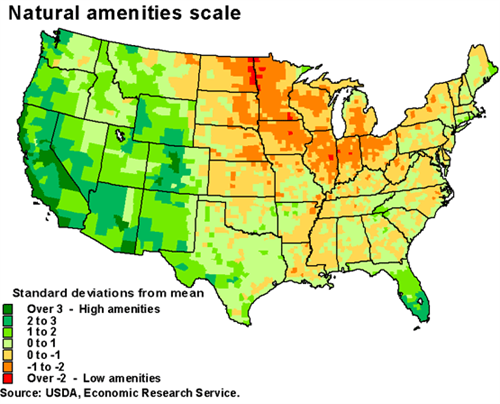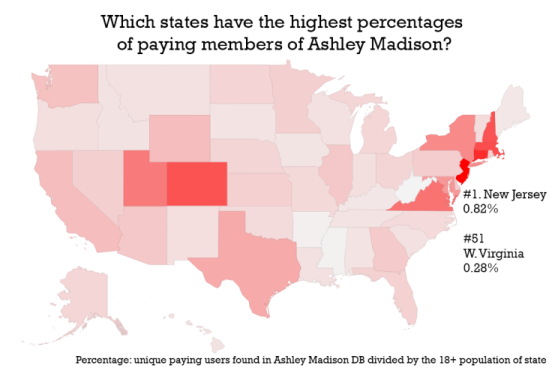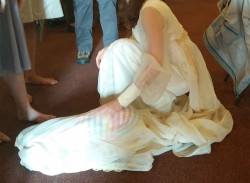Monthly Archives: September 2015
 We were taught that getting married later in life is better for marital prospects. While this is true up to a point, it may have its limitations and there may be such a thing as waiting too long.
We were taught that getting married later in life is better for marital prospects. While this is true up to a point, it may have its limitations and there may be such a thing as waiting too long.
This post, about overdevelopment of low-cost housing, would be a lot more interesting if it told us where it is.
North Carolina farmers are buying grain from Brazil because moving it by water in the US is made unfeasible by the Jones Act.
Alan Moore, grand innovator of superhero fiction, has come to believe that they are a cultural catastophe.
Late last year, Shinzo Abe’s government was linked to some far-right hate groups (“Kill, kill Koreans”).
Laura Seay and Alex de Waal discuss how to help people victims of international violent conflicts.
I didn’t know anything about King Edward VIII other than the whole “Eddie the Quitter” thing. I definitely didn’t know about the Nazi thing.
Tanzania has lost 2/3 of its elephant population in the last four years.
Micro-apartments are making a splash in the midwest. I’ve done the “micro-apartment” thing, of sorts in small-town Deseret.
Trees will make you feel younger and wealthier.
I’m actually just a slight bit sympathetic to this spoiled young lady, if her story is accurate: her parents really should have taught her better.
Samuel Liu looks at the self-segregation of Silicon Valley between white and Asian students.
Buffalo may be making a comeback.
The West Is Best! And the South is cool, too.

The next couple of images are Ashley Madison-related, paying customers and amount paid per capita.
So, Colorado, what have you to say for yourself? (It looks like Alabama has comparatively few people spending a lot of money. Not sure what’s up with that.
Last week, Burt Likko showed off the flags under consideration for New Zealand:
Of the four, I rank #3 (bottom left) the best, followed by #2, then #1 and #4.
For those of you who do not know such things, here are the five rules of flags:
- Keep it simple.
- Use meaningful symbolism.
- Use 2 or 3 basic colors.
- No lettering or seals.
- Be distinctive or be related. (Avoid duplicating other flags, but use similarities to show connections.)
Here are how the four score:
Flag #1 (top left): 5/5
Flag #2 (top right): 3/5, losing points for simplicity and being four colors.
Flag #3 (bottom left): 4/5, losing points for simplicity.
Flag #4 (bottom right): 5/5
So by pure vexillological standards, #1 and #4 are the best. Yet I prefer #3, followed by #2 and then #1 and #4.
To be honest, #4 has a weird almost fascist feel to it. I’m not sure why exactly. I’m also not sure about the black and white. But if you are going to have black and white, #1 one looks pretty cool. Even though the stars make it a little too complex, I still prefer the other two on account that they stand out. Even apart from the rules, I’m not a big fan of the four colors on #2. If you were to take the red out of the stars, though, I might prefer it to #3.
You can see New Zealand’s current flag to the right. Since it exists apart from the UK, other than the monarchy, it may seem odd that it has the Union Jack. I mean, Canada doesn’t ever since they got rid of the Red Ensign. However, it’s really not that unusual. Of course, among those that have kept the flag is Hawaii, which I can’t say I approve of.I wonder what Australia would have done if the republican referendum a little over a decade ago had passed. As the Queen of England remains their queen, there is no pressing reason that it should be changed. But that applies to New Zealand as well.
[Burt Likko’s post Over There has inspired this one.]
I.
I was raised Catholic, but from around the time of 5th grade through high school, I experimented with what we today call evangelical Christianity although I don’t think I used that term then. I never formally left the Catholic Church and never formally joined either of the Pentecostal and Baptist congregations I frequented. But I did participate in the youth groups of both my Catholic parish and those two congregations.
Along the way, I adopted many of the positions attributed to evangelicals. I believed we needed to be “born again” in Christ and that Christ was the way to salvation. I believed in the possibility of something like the Rapture and a time of tribulations, although I never had a firm position on when the Rapture would take place or whether it would happen before or after the time of tribulations. I believed the Bible was the truth although I probably was not a literalist. I also adopted much of the social conservative agenda often attributed to evangelicals. I believed the state should recognize Christianity on some level. I believed homosexuality was wrong. I believed abortion should be illegal.
When it came to issues like evolution and creationism, I had the not uncommon ability to heed conflicting ideas at the same time. I think I insisted that if we assume an all-powerful god, then young earth creationism and special creation were at least more than possible even though I’m not sure, now, how much or whether I believed in them. And yet, I think I accepted on some level the claims made for evolution, including the claim that humans evolved from pre-humans, who evolved from the same creatures from which apes and monkeys evolved.
But I objected to “science,” or what I took to be science. For me, “science” was best represented by those who relied overmuch on a facile rationalism and who rejected anything that was not material or observable or falsifiable. I wasn’t sophisticated enough at the time to put it in those words, of course. But I had in mind people like one physics teacher in my high school who according to some of his students (I never had him) spent class time discussing how religious people were stupid to believe in god when all the evidence seemed to disprove it. I also had in mind Carl Sagan. During my teen years, I watched reruns of “Cosmos.” I resented his repeated swipes against the claims of faith. Those swipes weren’t by any means the sum total of what Sagan was doing–in fact, I enjoyed watching the series–but it’s hard to deny that attitude was there.
II.
Enter college. As a freshman, I took a biology course that challenged those views. The course was co-taught by a biology professor and a philosophy professor ( the same philosophy professor I talked about in another post). In addition to the standard suite of introductory biology material–photosynthesis, the citric acid cycle, meiosis and mitosis, and a survey of life forms from prokaryotes to human beings–we did a lot of extra readings.
Some of these readings, like Dawkins’s Selfish Gene, an essay by Francis Crick, a book by Desmond Morris, Elaine Morgan’s Descent of Woman, and Paul de Kruif’s Microbe Hunters,/i> seemed to insist on the (sometimes callous, almost always unquestioned) materialist worldview that I had associated with science.
But others offered critiques of this materialist view. Thomas Kuhn’s Structure of Scientific Revolutions seemed to demonstrate that science is just as based on faith and the type arbitrary assumptions of which some scientists are so dismissive when they aver their disbelief in god. An essay by Paul Feyerabend seemed to argue that we give scientists too much power and too much deference to formulate public policy and we should allow other, non-scientific views. We also read a philosophical challenge to evolution. I forget the author or title of the piece, but it raised the possibility that evolution, while descriptively and historically accurate, doesn’t work well as a predictive scientific theory. This piece called evolution “the great tautology.”
In retrospect, my understanding of a lot of these works was faulty or at least incomplete. I probably misinterpreted Kuhn. I’ve since read up on Feyerabend and discovered he may not have been as “anti-science” as the piece I mentioned, taken by itself, seemed to me as a freshman. The “great tautology” piece was more a challenge to how we fit what is and is not “scientific” into neat categories and a meditation on what scientists mean when they call something a “theory.” (It definitely wasn’t the “tautology” argument you sometimes hear from young earth creationists or intelligent design advocates.)
But whatever my misunderstandings, those works taught me two things. One was that science was largely a method. The other was that not all scientists were the caricature of the raving materialists I had assumed them (all) to be, and plenty of people argued over and thought about what science is and has been, what its implications are or should be, and what it can and can’t say about the universe. And even the hyper-materialists were (at least sometimes) thoughtful people. (Whatever one thinks of Dawkins’s Selfish Gene, it wasn’t emblematic of the “irreligious right” tribe Dawkins later joined.)
There were bad things about that class. The biology professor, although a great instructor in many, many respects, sometimes used his bully pulpit and captive audience to make straw man arguments about theists, targeted especially but not solely at creationists. But being exposed to ideas you might not be comfortable with is part of what going to college is all about. And I’ve done worse.
III.
I don’t intend this essay as “an answer to Burt Likko.” Aside from some very minor points, I agree pretty much with everything he says in his recent post. I’ll just end with saying I’m glad I didn’t skip the reading.
Nima Sanandaji argues that Scandinavia’s success as a social democracy is exaggerated, and it’s success was despite rather than because of its welfare state.
As oil prices tumble, drillers are finding ways to cut costs. The refrain, though, never changes.
From a consumer standpoint, I’m glad that they’re making breakthroughs in storage space… but memory is the bigger hold-up lately and given the industry trends towards streaming that’s likely to remain the case. On the other hand, presumably cheaper storage will allow for better cloud usage and the like, maybe?
Julia Belluz looks at the evidence we do and do not have surrounding ecigarettes, and the different approaches between the US and UK.
The “Gig Economy” thing may be more myth than fact, as there has been no increase in self-employment among Millenials.
Will Boisvert makes the case for California keeping its last nuclear plant.
One of the arguments that confounds me is “Who cares if the threshold of proof is low and the standards of evidence are stacked against you when the only consequence you face is getting kicked out of a college?” The logical next step, though, is that it not be just one college.
Amy Tuteur argues that obstetricians may have gone too far in trying to prevent elective early deliveries.
How can those left behind rebound?
Maybe the solution for Puerto Rico is to ditch the US and rejoin Spain.
I have been meaning to post about this since the trip to Alaska, but it slipped my mind.
I didn’t have very many preferences when it came to the wedding. It was mostly as Clancy wanted it because when she wants her wants more than I want my wants, she gets her wants. She wanted to have it in Genesis, preferred that it be done by a judge. Fortunately, the things I did want were things she wanted just about as much. I wanted a crawfish boil involved, as did she. We both wanted Ben Folds’ The Luckiest played, and so it was.
One of the things I did want, though, involved the readings during the service. Specifically, I did not want the Corinthians passage played at every wedding ever (“Love is gentle, love is kind…”). Also, I wanted Ecclesiastes 4:9-12 read. They go as follows:
Two are better than one, because they have a good reward for their toil. For if they fall, one will lift up his fellow. But woe to him who is alone when he falls and has not another to lift him up! Again, if two lie together, they keep warm, but how can one keep warm alone? And though a man might prevail against one who is alone, two will withstand him—a threefold cord is not quickly broken.
Sounds simple, right? Except that I got my desire on neither of these things. The judge we hired had two “services” to choose from, both of which included Corinthians. The only difference is that one had part of the verse and one had the whole verse. The decision on which one to go with was made entirely to minimize the amount of Corinthian in said service. As for Ecclesiastes, that was held up by something else.
Originally, Clancy’s two sisters were going to be her maids of honor. A friend from high school and a friend from college were going to do the reading. That became a problem with Ellie, Clancy’s middle sister and the one who was married in Alaska, announced shortly before the wedding that she was going to be getting a divorce. That was not wholly unexpected, but unfortunate nonetheless because everybody liked the guy. I didn’t realize that it would end up a problem for Ecclesiastes.
The first effect was that Ellie announced that she no longer wanted to be a maid of honor because, since she was going through a divorce, it made her feel hypocritical to be front and center in somebody else’s wedding. Ooookay, I though. No biggie. The next one, though, was that she would be glad to read. There was, however, one rule: Nothing from the Bible. At all. Now the other reader, Clancy’s friend from high school, already had something picked out that specifically meant something to her and Clancy as a part of their friendship. So that wasn’t going to budge. We couldn’t pick another reader entirely because family.
And so… no Ecclesiastes.
I have oddly had a bit of a chip on my shoulder about it ever since. Nothing that prevented me from forming an absolutely great relationship with my sister-in-law. But… dangit, I just wanted one thing and her stubbornness at a couple of points prevented that from happening.
I did more or less get over it, which lead to my laughter in Alaska.
I had to leave the hall to take care of Lain, who was a getting fussy. I mean, I was kind of giddy that she was able to string together the sentence “Want to go home” but… oh well. So I took her outside. So I was only barely able to hear Clancy’s mother, reading, at Ellie’s wedding…Two are better than one, because they have a good reward for their toil. For if they fall, one will lift up his fellow. But woe to him who is alone when he falls and has not another to lift him up. Again, if two lie together, they keep warm, but how can one keep warm alone? And though a man might prevail against one who is alone, two will withstand him—
a threefold cord is not quickly broken.
 Astronaut Edgar Mitchell believes that nuclear war was averted by peace-loving aliens. (Also, Buzz Aldrin, nailing it.)
Astronaut Edgar Mitchell believes that nuclear war was averted by peace-loving aliens. (Also, Buzz Aldrin, nailing it.)
Sarah Kliff of Vox watched all of the Planned Parenthood videos (up through 8/13) and put together a surprisingly fair report. I hope she does so again after they were all released.
Chris Cuomo put his finger on the real problem with the ISIS/sex slavery story… it feeds negative stereotypes.
The EPA holds polluters accountable, but who holds the EPA accountable?
I tend to assume those politicians that talk about keeping Chick-Fil-E and such out of their town are chest-pounding for the cameras. Turns out, looks like they mean it.
I will absolutely watch Dante’s Devine Comedy film(s), but I will absolutely go into it with low expectations.
“Unless the doctor’s pay is somehow linked to performance, there is a good chance that the quality of care in the public sector would be worse than in the private sector.”
This makes sense: Vox reports that during recessions, college students pick money-making majors.
A look at data and elections, from Texas.
If you’re worried about political self-segregation online, it’s apparently nothing compared to real life.
An all-important question has been answered: On Friends, how much does Joey owe Chandler.
Well, I suppose bribery may indeed be an inelastic good.
Tina Rosenberg looks at the kidney market in Iran.
Razib Khan looks at the history of the British and the Caste System of India.
Meet Moore’s Law’s evil twin.







